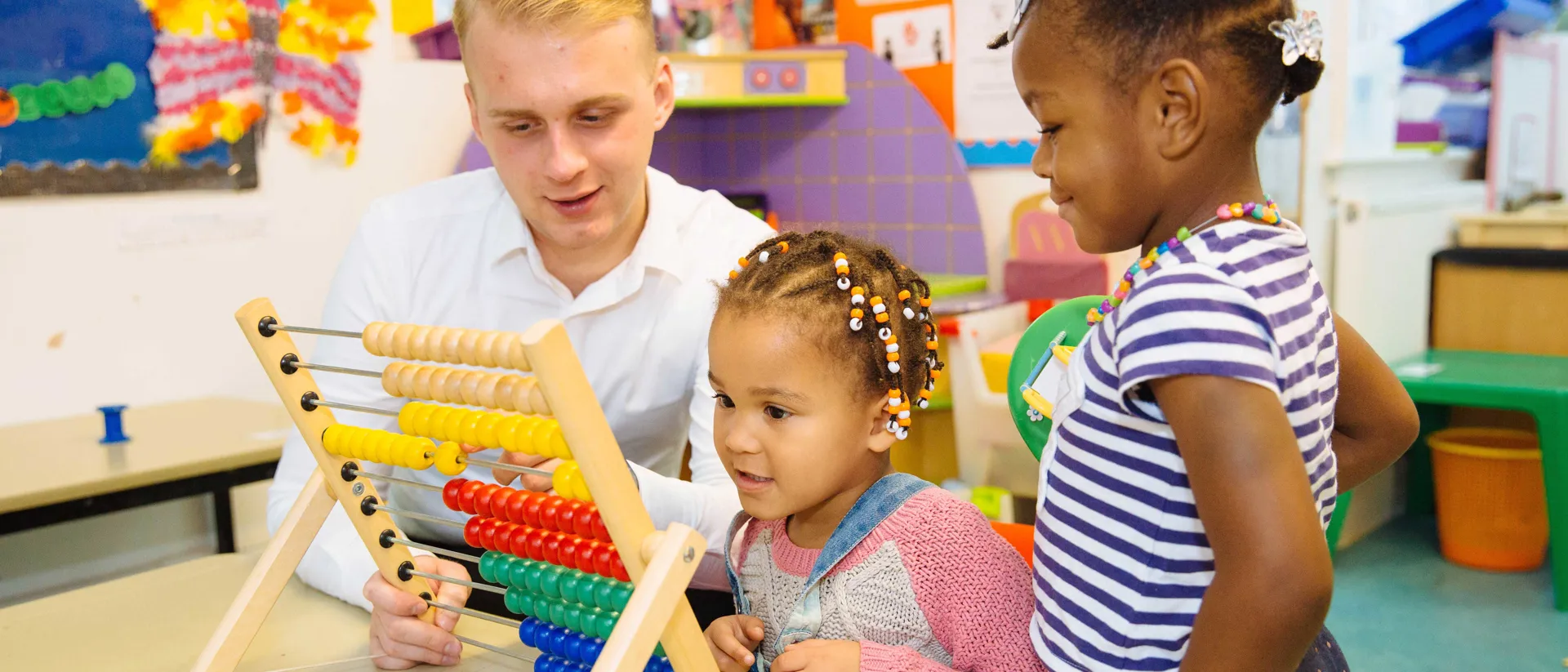Why should I choose this course?
- FLEXIBLE ONLINE LEARNING – Want to boost your skills while maintaining full-time/part-time employment? Studying our Childhood and Education Studies degree online provides a flexible approach to learning
- SPECIALISE YOUR STUDIES – Study and research specialist topics through optional modules, a final dissertation project and innovative assessment regimes
- DIVERSE SKILLS AND KNOWLEDGE – Build your understanding around childhood development, social trends and legislative frameworks alongside employability skills for your future career
- NO EXAMS - If you are not keen on exams, this course is for you. Unlike many degrees in this field, you will have no written exams during or at the end of the course and will be assessed through coursework only
- AWARD-WINNING UNIVERSITY – Study at the highest-ranking university in the region according to student choice (Whatuni Student Choice Awards 2023)
Course breakdown
- Year 1
- Year 2
- Year 3
Core Modules
Developing Professional Identity (online)
This module invites you into a process of self-discovery on your journey towards becoming a Childhood and Education Studies graduate. You will engage in a variety of creative activities to help you identify your personal qualities and you will learn how to articulate these to make you stand out in practice. Dilemmas that arise when navigating personal values in a variety of professional contexts will be explored and discussed. You will have an opportunity to demonstrate your learning and development as a Childhood and Education Studies graduate in a professional portfolio that showcases your professional identity.
Effective Pedagogical Approaches in Education (online)
The module is designed to provide you with an understanding of a range of pedagogical approaches, both traditional and contemporary. There will be opportunities to explore factors relating to pedagogical thinking, approaches to education and the impact these have on teaching and learning, nationally and internationally. As part of this, you will develop an understanding of teaching strategies from Early Years through to Further Education, considering the role of questioning, modelling, creativity, peer teaching, enquiry-based learning and direction instruction. Alongside this, you will reflect on factors impacting on the success of these approaches, such as student learning styles and education policies.
Evidence Informed Graduate Practice (online)
This module is designed to provide you with the skills required to identify challenges relevant to childhood education and to understand how research and evidence can be used to address these challenges. Most importantly, in this module you will consider how these key skills apply when working with children and young people, and how you can use research and evidence to inform day-to-day practice (evidence-based practice). You will explore how research and evidence-based practice go hand in hand rather than seeing research as an abstract or 'other' thing separate from day-to-day work. Throughout the module, we will explore how you can use research findings to better inform your professional practice.
Human Growth and Development in Childhood and Young People (online)
The module will provide an opportunity for you to explore human growth and development including how biological and environmental experiences play a major role in influencing development and learning, with a particular focus on infancy, childhood and adolescence. By understanding the developmental stages this will support you in identifying individual difference, including developmental delay, as part of your role in ensuring children and young people have the necessary educational support to maximise success in both educational and social domains of their lives.
Protecting and Safeguarding Children and Young People (online)
This module provides a comprehensive framework of knowledge and understanding for you, regardless of your domain of practice, to safeguard children and young people. You will be able to identify signs of abuse and neglect, recognise when children and young people may be at risk supporting your understanding of the legislative framework, and your role as part of working within a multi-disciplinary team in ensuring effective graduate childhood and educational practice.
Sociological Perspectives of Childhood and Education (online)
This module aims to introduce you to the critical analysis of childhood and education from a range of sociological perspectives. You will be made aware of current debates in this sub-field and will be encouraged to draw upon established sociological theories to understand and explore issues surrounding the changing constructs of 'childhood' and 'the child'. The module also aims to introduce you to a variety of contemporary issues surrounding childhood, including gender, intergenerational care, familial structures, and the child as a consumer. From an education perspective, you will explore the impact of the Covid-19 pandemic alongside current debates surrounding Ofsted, mental health and well-being, British Values and the influence of globalisation and technology on the way children and young people learn. These issues are designed to encourage you to look beyond the contemporary Western model of childhood towards the plurality of childhood experiences across time and space.
Core Modules
Creativity and Critical Thinking in Education (online)
This module will explore the nature of creativity and critical thinking across childhood and adolescence. It will look at the role of creativity in supporting flexible thinking and imagination in early years and educational settings. Definitions of creativity and the role of critical and divergent thinking in children and young people's development will be determined. You will be able to review the differing psychological factors affecting the development of creativity, including aspects of motivation, personality and intelligence and their relationship to encouraging creative expression. It will look at freedom and control elements in creativity, the role of symbolic representation, the links between creativity and other areas of development, as well as exploring the role of the practitioner and the environment. Curriculum frameworks and documents will also be explored alongside the importance of addressing the creative needs of children with varying abilities and needs.
Developing the Social Brain & Implications for Education Practice (online)
The term 'social brain' refers to the network of brain regions that are involved in understanding others. From birth human beings are primed to seek and respond to those around them. The learning brain is inherently social in nature and as such cognitive processes and behaviours are deeply influenced by social interactions. Navigating this human endeavour is complex and fraught with competing internal and external factors, therefore this module invites you to explore some of the current debates regarding the development of the social brain and the significant role this has in shaping an individual's learning and educational performance.
Education & Health Inequalities (online)
This module explores health inequalities; what they are, the various factors that lead to health inequalities and how these affect a child's development, education and outcomes. The Social Determinants of Health will be considered in the influence of the health and well-being of a child and the external influences of mass media, public policy, health rights and public health interventions will be examined to identify how they contribute to the health and well-being of children. It explores the physiological, psychological, and social health needs of various demographic groups in different settings and communities in order to understand the holistic nature of the term 'health' in relation to a child's education.
Leadership and Management in a 21st Century Context (online)
This online module focuses on a broad range of themes associated with leadership and management in a variety of contexts across the childhood and education sector. You will examine contextual challenges faced by leaders and managers, offering opportunities to link this to theoretical frameworks and practice. During this module, you will consider factors associated with leadership which will include human resource management, key themes in practice, quality, change, collaborative working, emotional intelligence and organisational culture, plus how coaching and mentoring can support your leadership potential. At the end of this module, you will have knowledge of theories associated with leadership and management, responsibilities and skills, the nature of leadership and the identification and reflection on current issues in support of career enhancement and graduate practice.
Principles of Curriculum Development (online)
This module invites you to consider the core principles underpinning curriculum design. As part of your study, you will reflect on the purpose, content, delivery, and monitoring of an inclusive curriculum that meets the needs of all children. Furthermore, you will examine and evaluate competing curriculum development models and pedagogical and philosophical debates to justify your vision for a 21 st -century curriculum.
Research for Enquiry in Childhood Education Studies (online)
The module introduces the student to the management and application of research. The primary aim of the module is to develop students' skills and expertise in the evaluation and use of essential research tools. The application of these tools will be done through online activities and directed reading. The module develops inquisitiveness and challenge through developing an awareness of multiple perspectives for studying, analysing and understanding phenomena. Students will be encouraged to challenge research, both national and international and data through systematic analysis. This enquiring approach will engender in students the ability to view research as tentative, to be revised and reconsidered.
Core Modules
Contemporary Issues in Education, Learning & Graduate Practice (online)
Throughout this module, you will explore and discuss contemporary issues in education from many contrasting perspectives. By engaging in debates and exploring different assumptions and arguments, you will consider social, cultural and political factors that affect the education of children, the profession of educational practitioners, as well as the influence of parents and other key stakeholders. Through varying theoretical and philosophical frameworks, you will make connections between theory and practice in your own professional context. The topics studied will be relevant to your year of study in relation to contemporary issues within childhood education at that time.
Dissertation (online)
Engaging in individually selected and directed research is one of the highlights of an undergraduate degree and in this module you will be introduced to the skills and competences needed to explore your selected topic in depth to ensure you gain the most from this opportunity. Research at this level can be a daunting process but you will be appointed a dissertation tutor who will help guide you through this important and rewarding process.
Graduate Practice in a Simulated Learning Environment (online)
An online module focussing on virtually simulated placement that allows you to experience realistic industry-inspired scenarios and experiences that develop the knowledge, skills and behaviours needed for a graduate career in childhood and education. This bespoke virtual placement module provides an experiential learning approach to developing the ability to manage industry situations involving personal reflection to support professional development. The advantage of our simulated placement is that it allows you the unique experience to be exposed to challenging situations and experiences within a safe learning environment with the support of your peers and industry expert lecturer/s. Scenarios will include a variety of challenging situations, some of which you would not be guaranteed to experience through a standard live placement such as safeguarding disclosures, accidents in the classroom, managing conflict resulting in difficult discussions. You will experience a range of scenarios that will equip you with the competencies required to work in the education sector across a variety of age ranges and settings.
SEND in Childhood and Education (online)
This module invites you to critically reflect on issues in education that can be experienced as barriers to children's inclusion. As a key part of your study, you will acquire knowledge of different theoretical perspectives relevant to supporting the learning of children with Special Educational Needs and Disability (SEND) and appraise these within an educational context. Furthermore, you will develop an appreciation of your own position as educators and increased awareness of your strengths and areas for development when implementing an inclusive curriculum.
Developing Digital Literacies in Childhood and Education (online)
This module invites you to critically reflect on contemporary issues that have a significant impact on the development of learners' digital literacies and future employability roles. As a major part of the study, you will be developing knowledge about learner's digital cultures and the implications for pedagogical practice and the curriculum. You will understand how digital literacies can enrich learning experiences, the tools and learning techniques to empower learners to collaborate and solve problems, and the implications for policy and assessment reform. Furthermore, you will contemplate about the association between the commitment to social justice and access to digital literacy learning for learners and those who support their learning.
Entrepreneurism and Business (online)
This module will allow you to consider yourself as an entrepreneur within the Childhood and Education sector. As part of your study, you will reflect on and develop your own entrepreneurship skills as a practitioner and consider how these could implement your career choices and impact your practice. During your study, you will be given an introduction to entrepreneurship and critically analyse theoretical perspectives on entrepreneurship skills. You will also consider entrepreneurship Education as a pedagogical approach and how this may impact teaching and learning. You will be invited to explore the foundations of business and underpinning elements such as design and marketing skills, collaborative relationships, leadership, meeting necessary requirement etc. Overall, this module will provide essential transferable skills, applicable to your course and future career within Education.
Social Justice in Work with Families, Young People and Communities (online)
You will critically examine the historical and current roles played by professionals working with families, young people, and communities in relation to human rights, social justice and oppression. This will include the current and historical development of the legislative framework for anti- discriminatory practice. You will learn about key aspects of empowerment and development in practice. Ethical issues faced by workers in undertaking anti-oppressive/anti-discriminatory practice especially when working with marginalised individuals and groups with be reflected on. You will also explore the role of identity and culture in relation to development work and to working with diversity
PLEASE NOTE: The following modules offered in year three are optional modules (you can choose one):
- Developing Digital Literacies in Childhood and Education (online)
- Entrepreneurism and Business (online)
- Social Justice in Work with Families, Young People and Communities (online)
The modules listed above for this course are regularly reviewed to ensure they are up to date and informed by industry as well as the latest teaching methods. On occasion, we may need to make unexpected changes to modules – if this occurs, we will contact all offer holders as soon as possible.
Entry requirements
Year 1 entry
Either:
- Level 3: Achieve a relevant Level 3 childcare qualification.
- Level 3: Non-related subjects at Level 3 are accepted at University College Birmingham for entry. A minimum of 72 UCAS Tariff points will be required.
Plus:
- GCSE/IGCSE English Language: Grades A*-C/9-4 or equivalent.
Year 2 entry
Academic: A relevant HNC or equivalent qualification at Level 4 in the areas of Early Years, Childcare or Advanced Practice with Children and Families, with 120 credits.
Additional requirements:
GCSE/IGCSE English Language: Grades A*-C/9-4 or equivalent.
International students
For academic and English entry requirements for EU and international students, please visit the Country Specific Information page.
Please note: As an International Student, when choosing optional placement, a visa extension may be required.
Key information
Teaching and assessment
Note: Indicative information only – actual timetables and assessment regimes will be issued at your induction.
Teaching
You will be expected to engage independently with module online learning and teaching materials throughout the course. To support there will be online evening sessions that you are expected to attend including Graduate Advantage sessions and individual tutorials with an allocated personal tutor. For your final year dissertation, you will be supported through five 15-minute meetings with your supervisor via web conferencing software.
All modules include:
- Online module content to access independently available via UCB’s virtual learning platform.
- Online discussion forums where you can collaborate with other students.
You will need to allocate a minimum number of study hours per week, though some weeks may require you to extend beyond this, particularly when you are engaged in completing assessments.
Assessment
Estimated breakdown of assessment for this degree course:
- Coursework– 100%
Assessments will employ a diverse range of technologies.
Our teaching and assessment is underpinned by our Teaching, Learning and Assessment Strategy 2021-2024.
Tuition fees for home students
If you are a home student enrolling on an online course at University College Birmingham, the 2025/2026 tuition fee is £6,300 per year.

Without this online learning platform, I wouldn’t have continued with my studies and would’ve missed out on a future career in education and teaching. I would encourage anyone to take up this online degree to achieve their career goals and I’m grateful to the outstanding online education department for providing this opportunity.

Have questions around your chosen subject or course content? Are you wondering what you can expect to study as part of your course? Fill out our form and chat to a lecturer.
Career opportunities
Note: Some roles below may require further study/training. The roles and salaries below are intended as a guide only.
Community education officer
Average Salary: £28,000
Counsellor
Average Salary: £31,000
Education administrator
Average Salary: £33,500
Learning mentor (school)
Average Salary: £18,750
Childcare worker
Average Salary: £16,893
Special educational needs coordinator (SENCO)
Average Salary: £30,172

Viki’s Story
Viki’s decision to study online with University College Birmingham boosted her career while enabling her to spend quality time with her young family.
Course statistics
BA (Hons)
Meet your lecturers









